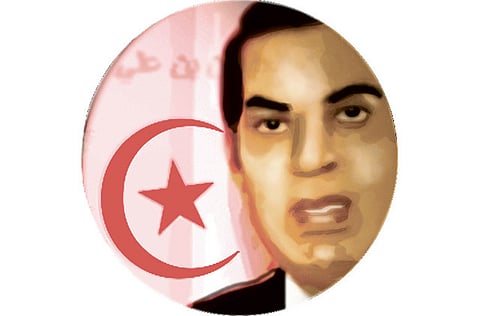Technology plays a crucial role in Tunisia
Had there been no Facebook, Twitter, YouTube and Al Jazeera, what happened in Tunis would have remained in Tunis

For the millions of young people watching Al Jazeera last Friday, or those glued to their laptops, history was being lived, made, and appreciated, not only in Tunisia, but throughout the Arab and Muslim world. Many immediately changed their Facebook profile picture, replacing it with the flag of Tunisia. Others typed in the status "Viva Tunis".
The show reached its climax when an exhausted and defeated Zine Al Abidine Bin Ali was finally given permit to land in Jeddah where reportedly he will temporarily stay at the same villa given to Ugandan president Idi Ameen, who was also toppled when Uganda collapsed, back in 1979. Ameen — a brutal dictator by all accounts — never returned to the country he had held with an iron grip since 1971. Like Ameen, Bin Ali's term was marked with corruption, unemployment, and human rights abuses. Ameen died 24 years after leaving office, dreaming of a comeback to power in Uganda. Like Ameen, Bin Ali probably currently has one thing on his mind: returning to the Presidential Palace in Tunis and taking revenge.
The generation of overnight Tunisia-fans in the Arab world is a phenomenon worth observing. These young people, mostly aged below 25, know little to nothing about Bin Ali. He was never in the heart of the Arab-Israeli conflict and generally, non-Tunisians were neutral about him simply because they knew very little about the man who had ruled Tunisia since 1987. He was never a Jamal Abdul Nasser or Anwar Sadat, certainly no Yasser Arafat or Saddam Hussain. These young Arabs, born and raised during the Bin Ali era, were nevertheless able to put a name and face, to an Arab head of state. They grew up with a fairly straightforward fact: Saddam Hussain was Mr Iraq, Yasser Arafat was Mr Palestine, — and Zine Al Abidine Bin Ali was Mr Tunisia. The sudden interest in Bin Ali and Tunisia actually has very little to do with Bin Ali and Tunisia. Many Arabs were inspired that perhaps someday, somehow, they would get rid of their aged and ailing presidents, in similar fashion — through the street, and not through US assistance, as the case of Iraq in 2003.
The Tunisia affair was indeed an eye opener, and now, four days later, several realities have begun to sink in — the hard way, in the Arab psyche. One is that had there been no Facebook, Twitter, YouTube, and Al Jazeera, perhaps, what happened in Tunis would have remained in Tunis. The significance of satellite TV and social media network cannot be stressed enough — it literarily inflamed the Tunisian street. That is what made 26-year-old street vendor Mohammad Bouazizi, who set himself ablaze and triggered the entire ordeal, a national hero. No matter how hard Tunisian authorities tried, nobody could hide his story forever.
Another reason why young Arabs are so excited is that they have never seen anything like this in their lives. Both the Egyptian Revolution of 1952 and the Iranian one of 1979 happened before they were born, and both got none of the coverage Al Jazeera or Twitter gave the Bin Ali saga. The only recent thundering collapse was Saddam Hussain in 2003 — but sadly that was done by an occupying force, not by the Iraqis themselves.
Collapsed
A second reality is that under no circumstances should the West ever be trusted. Without even blinking, Europe and the US ditched Bin Ali — a firm ally for over 20 years — the minute it was clear that his regime had collapsed in Tunis.
US President Barack Obama, whose country has turned a blind eye to all of Bin Ali's repressive measures, came out with a booming statement about the "brave and determined struggle for the universal rights we must all uphold".
He added, "We will long remember the images of the Tunisian people seeking to make their voices heard," praising "courage and dignity" of the demonstrators. For decades, the US provided Bin Ali with unlimited political cover, economic assistance, and military aid: $15 million in 2010 and an expected $12 million in 2011. And never for a moment did it "not know" what Bin Ali was doing in Tunis, with recent WikiLeaks reports saying that diplomats at the US embassy in Tunis described the country under Bin Ali's rule as a mafia.
France's President Nicolas Sarkozy went even further, refusing to allow Bin Ali's plane to land in France while praising the "democratic will" of the Tunisians. The story hauntingly reminds us of how after long years of ardent support of the West, Iran's Shah Reza Pahlavi was refused asylum in the US after the outbreak of the 1979 Revolution.
Britain did the same, adding that the Shah of Iran was no longer welcome at his estate in Surrey. Brazil, Argentina, and New Zealand also took their cue from the US and denied him asylum. When leaders bet on their people, like Nasser did in the 1950s, they survive upheaval, whereas when they lean on the West, they all suffered Bin Ali's fate.
Sami Moubayed is editor-in-chief of Forward Magazine in Syria.



